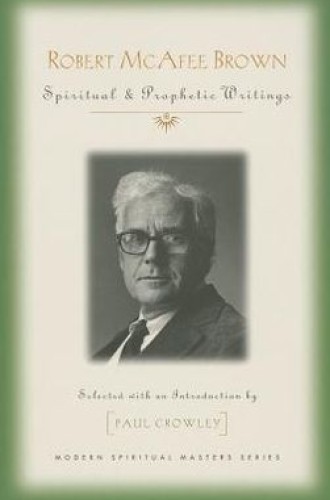Robert McAfee Brown, selected with an introduction by Paul Crowley
Decades ago when I was a graduate student at Union Seminary in New York City, Robert McAfee Brown was the hot young teacher of theology. He was exceedingly popular—funny, learned, passionate and engaged, greatly admired and greatly beloved. The rumor among us graduate students was that he was likely to be the next president of the seminary. In our graduate-student myopia, we could imagine that the pinnacle of a theological vocation would be to ascend to the peacock seat occupied by Henry Pitney Van Dusen. Little did we know that Bob Brown was destined to a very different life and a very different vocation. He surely would have been ill cast to be burdened with the chores of an administrative office.
After his steadfast years at Union Seminary, Brown migrated to Stanford University, where he was drawn into matters of the public square. As a colleague and ally of B. Davie Napier, who was then dean of the chapel at Stanford, he used considerable energy making the case that faith (and therefore theology) must address political issues because it belongs to the nature of Christian faith to do so. Apparently the matter was contested at Stanford, home of the right-wing Hoover Institution. Later Brown returned to Union Seminary for a stint as a visiting professor. By that time he was fully engaged with a liberation hermeneutic and the activism that he derived from it.
Read our latest issue or browse back issues.
Paul Crowley has produced a rich collection of Brown’s speeches and essays, organized according to five themes: “Foundations of a Prophetic Soul,” “Living the Gospel of Justice,” “The Struggle for Human Rights,” “Peacemaking” and “Interfaith Solidarity.” The grand sweep of Brown’s talk and walk makes clear that he was engaged—with energy, passion and courage—in all of the great public questions of his day and that his faith authorized him for that engagement. His testimony is unerring in its linkage of faith and public life, revealing not only a clear thinker but a passionate believer. Brown was much informed by the thought of Reinhold Niebuhr, his senior colleague at Union Seminary, but he pushed in new directions beyond Niebuhr’s realism.
One can dip into this wondrous collection anywhere and get a sense of this man of faith and his ability to connect the Christian tradition to the issues on the ground. He bore witness, in a sermon, to the way in which Dietrich Bonhoeffer lived out his vocation; he addressed a conference at the opening of the Holocaust Museum; he spoke to a general chapter of the Sisters of Mercy; he offered a prayer in remembrance of Óscar Romero. In the latter he finished with lines in Spanish, a language he regarded as indispensable for anyone advocating liberation and justice in international scope.
In his address to the nuns he appealed to the teaching of Vatican II and reminded them that mercy always entails justice concerning political and economic systems. In his remarkable address to the World Council of Churches in Nairobi, he testified:
Commitment to Jesus Christ divides Christians from the majority of the human family who make no such commitment. He divides us from the secular colleagues with whom we work, from our Jewish friends with whom we otherwise share so much, from Hindus, Muslims, Buddhists, Marxists and humanists. That is simply a fact of human experience.
In “The Struggle for Human Rights,” Brown explained why he had joined the Freedom Rides and why he opposed the anti-immigration Proposition 187 in California. Concerning gays and lesbians, he declared:
But one cannot remain forever in the supportive atmosphere of the seminary classroom. . . . It is a scandal for us to claim to be an open and inclusive community with room for all when we are not. . . . We pretend to ourselves that to welcome to membership but to deny ordination should be considered a satisfactory resolution of the problem. Such talk gives grounds for hypocrisy in what we mean by membership.
On these as on many issues, he was well ahead of his time.
He was strongly engaged with the crisis of the Vietnam War, standing with those who burned their draft cards. In 1972 he preached a Christmas Eve sermon at the Stanford Memorial Church concerning the U.S. military’s massive bombing of Hanoi.
Brown was also at the forefront of a great deal of ferment in ecumenical exchange. He was an observer at Vatican II and engaged deeply with Catholic social teaching. On the one hand, he insisted that Protestants can be instructed by that teaching; on the other hand, Catholics asked him to probe and develop its implications.
His ecumenical passion reached beyond Christian solidarity to engage with Judaism. In a 1983 sermon, he bore witness to the judgment of his friend Elie Wiesel that “faith is a constant struggle with God.” Brown spoke at a Jewish-Christian conference in Minneapolis in a risky and candid way. After a series of affirmations about what “Jews have a right to expect from Christians” concerning the security of the state of Israel, he offered three statements on what Christians have a right to expect:
1. Christians have a right to hear from Jews that criticism of the state of Israel will not automatically be labeled as anti-Semitic.
2. Christians have a right to hear from Jews that Jews understand that disagreement about the state of Israel is not just a political matter but a theological matter as well.
3. Christians have a right to hope that Jews will speak critically when the state of Israel engages in unjust actions.
On all of these issues Brown was a stunning spokesperson for what subsequently became consensus liberation perspectives. And he was way out front on the connection of faith with public life. It should not be imagined, however, that he was simply a knee-jerk liberal activist. All the time he was engaged, he was teaching theology. In a sermon early on, he reflected on the soteriological claims of Christian faith:
Christian faith says that the root of the problem lies within our hearts. That our wills have gotten distorted. . . . The perverse glorification of myself at the expense of yourself, and both of us at the expense of God. That is what needs to be cured.
His action was always critically grounded in his faith and in his hope in the gospel.
This collection is valuable because it traces the way in which this first-rate theologian moved to a liberationist perspective, driven by the impulse and summons of the gospel. Many in Brown’s generation made that move, but none more effectively and compellingly than Brown and his wife Sydney. It is important to treasure the memory and legacy of Brown as an embodiment of the way in which the gospel propels us beyond what is conventionally acceptable.
Brown’s life is an enactment of Romans 12:1–2. He refused to be conformed and was transformed. He renewed his mind. He presented his body as a living sacrifice and he discerned the will of God. In her generous foreword to the book, Judith Dunbar proposes that we remember Brown in the way that those who died in the struggle for justice in Central America have been honored. A name is called and the response is, “¡Presente!” Thus: “Robert McAfee Brown . . . ¡Presente!”
This book may be a summons to those of us who tend to be AWOL at moments of kairos.






